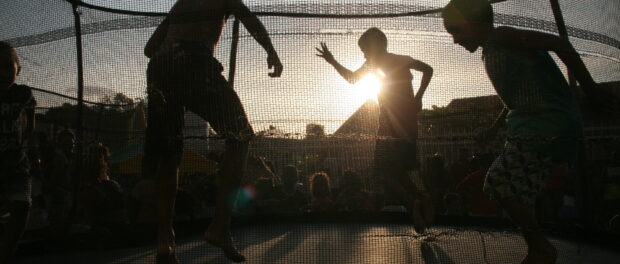
On Sunday, November 22, Brazil’s first favela, the community of Morro da Providência, celebrated its 118th birthday. Though the exact day is unknown, it is popularly understood that Providência was born in November 1897.
Following Brazil Black Awareness month events that kept residents busy til night, Providência’s birthday celebrations began at 2pm. In the heart of the Port Region, Providência is surrounded by some of the most important Afro-Brazilian heritage landmarks, such as the Pedra do Sal Quilombo and the Valongo slave market, which hosted celebrations of the black cultural DNA that flows through the veins of the Brazilian popular identity at large.
Providência’s birthday party was held next to the Gamboa Olympic Vila and amidst construction works of the new light rail transport system, both projects of the Marvelous Port port revitalization program. In the early afternoon technicians worked to set up the stage, musicians gathered under a large tent, and community traders prepared stalls to sell drinks during the celebration.
Giselle Diaz, new president of the Neighborhood Association, hurriedly approached the musicians, and apologized for the delay. The feijoada--a traditional Brazilian pork and black bean stew–was nearly ready, she said. Giselle recently took over an Association that has been criticized for not attending to the needs of the community, especially when it was suffering forced evictions. She is seeking to change this, or as she says “to make it function,” starting with creating a workable office space. The birthday party helped with raising funds for this.

At 3pm traditional firecrackers marked the start of the party and residents came down the hill following the smell of feijoada made by Dona Jurema, winner of a culinary contest held in the region. Soon after music started with the performance by local samba group Velhos Malandros.
Music and people filled up the large tent and vendors sold drinks from their stalls. The vendors were community members, many grateful for this opportunity to trade after the previous night’s funk party had been once again cancelled. Funk parties were prohibited in the community during the first years since the installation of a Pacifying Police Unit (UPP) in 2010. Providência’s funk party producer reports that it still gets cancelled from time to time, though on this occasion the event was rained out.
Events like the funk party and anniversary event stimulate the local economy and provide trading opportunities for residents. Raul, a resident and vendor in his early 20s, said: “We are all street vendors too, we try to sell at Central do Brasil… But things are getting difficult, you know? Well, they’ve always been.” Raul told of how street vendors–known as camelôs in Brazil–suffer violence and repression from the Municipal Guard who confiscate their goods and no longer allow them to sell by the nearby Central do Brasil, the city’s central station where street vendors traditionally sell their wares. “We need to make a living too. How are we supposed to pay the rent, for our food?” He added: “The party is good, we can sell our stuff here. But it is also a privilege being able to celebrate Providência’s birthday: it’s the oldest favela!”
Later the music changed and faster Carnival samba rhythms filled the air as the Vizinha Faladeira Samba School–one of the oldest samba schools in Brazil–performed.
As well as music, dancing and food, the event included a projection of photographs by local artist Maurício Hora, including his latest project combining images of Providência with photos taken in the village of Canudos in northeast Brazil. The first favela was established after soldiers who served in the Canudos War were promised payment in the form of land in Rio, but upon arrival, found there was none awaiting them. They squatted in front of the Ministry of War until a colonel told them to squat on a nearby hill, known today as Providência hill. Maurício said that celebrating the Providência’s birthday is more than just a local, neighborhood party; it celebrates the start of a way of life, of the creation and spread of favelas and their significant contributions to the city’s life and culture.
Providência’s rich history and cultural life has long attracted artists, including international artist JR brought by Maurício, with whom he created the Women Are Heroes art project there in 2008. Maurício also collaborated with Portuguese street artist Vhils who sculpted evicted residents’ portraits into the community walls to protest forced evictions in 2013.
An artist and graffiti professional who recently moved to Providência after more than 25 years working in carnival samba warehouses, Marcelo is helping Maurício revitalize the community’s cultural center, known as the Casa Amarela (Yellow House), to offer workshops for Providência’s children. Marcelo spoke of his optimism for Providência’s future and of Saturday’s anniversary celebration: “We need these kinds of events. They bring joy and bring community members together.”


